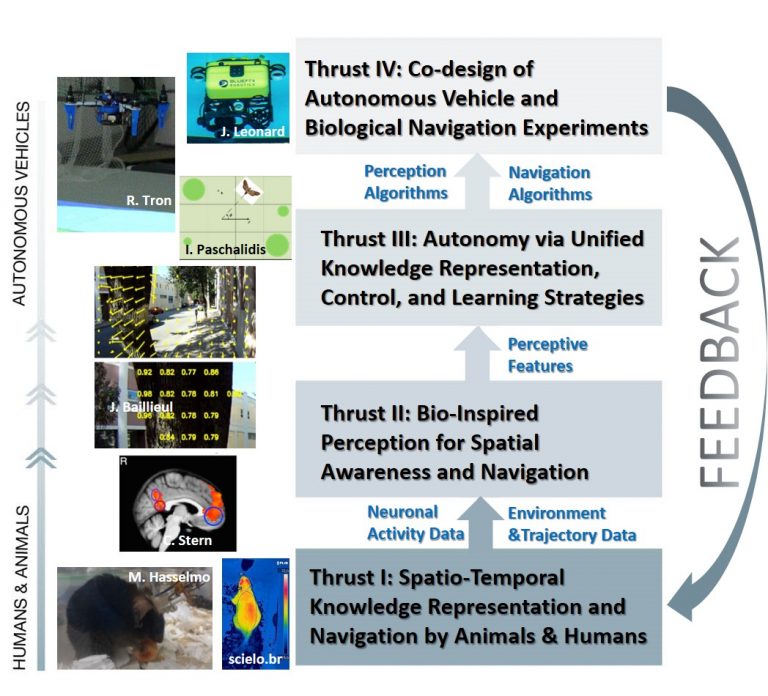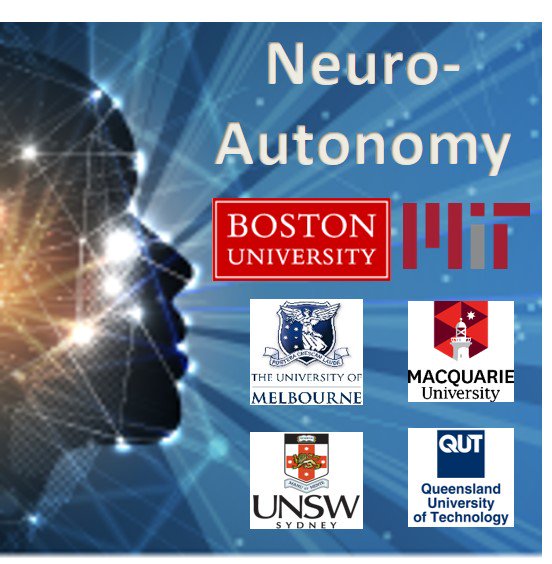
Neuro-Autonomy: Neuroscience-Inspired Perception, Navigation, and Spatial Awareness for Autonomous Robots
MURI Project Title: “Neuro-Autonomy: Neuroscience-Inspired Perception, Navigation, and Spatial Awareness for Autonomous Robots”
Project Website: http://sites.bu.edu/neuroautonomy/
https://electrical.eng.unimelb.edu.au/control-signal-processing/neuro-autonomy
The following content is extracted from the http://www.bu.edu.
A Boston University-led research team was selected to receive a $7.5 million Multidisciplinary University Research Initiative (MURI) grant from the U.S. Department of Defense (DoD). With this prestigious grant, the researchers will develop a novel category of neuro-inspired autonomous robots for land, sea, and air that the investigators have termed “neuro-autonomous.”

The initiative will tackle the challenge of how to make robots truly autonomous as well as provide important insights into the process of learning and memory formation. The project will be led by Yannis Paschalidis, director of the Center for Information and Systems Engineering, and professor in the College of Engineering at Boston University.
The winning team of researchers is a Dream Team of experts from Boston University and the Massachusetts Institute of Technology. It includes experts in neuroscience, robotics, computer science, computer vision, artificial intelligence, mathematical systems theory, and a host of other related advanced technology domains. The project will also benefit from collaboration with renowned researchers from the University of Melbourne, Macquarie University, Queensland University of Technology, and the University of New South Wales.

This project aims at developing next-generation AVs, capable of learning and on-the-fly adaptation to environmental novelty. These systems need to be orders of magnitude more energy efficient than current systems and able to pursue complex goals in highly dynamic and even adversarial environments.
Biological organisms exhibit the capabilities envisioned for next-generation AVs. From insects to birds, rodents and humans, one can observe the fusing of multiple sensor modalities, spatial awareness, and spatial memory, all functioning together as a suite of perceptual modalities that enable navigation in unstructured and complex environments. With this motivation, the project will leverage deep neurophysiological insights from the living world to develop new neuroscience-inspired methods capable of achieving advanced, next-generation perception and navigation for AVs.
For more detail info, please visit the BU website.
BU-led Research Team Wins Competitive $7.5 million MURI Grant to Create Neuro-Autonomous Robots
MURI Project Abstract, Approved for Public Release
How to Make Self-Driving Vehicles Smarter, Bolder
Aussie and US uni collaboration to work on next-gen autonomous systems
About
Brain Inspired Navigation Blog
New discovery worth spreading on brain-inspired navigation in neurorobotics and neuroscience
Recent Posts
- How locomotor development shapes hippocampal spatial coding?
- How human, animals, robots encode and recall place?
- How the brain constructs time and space and how these are related to episodic memory?
- How environmental novelty modulate rapid cortical plasticity during navigation?
- How the Hippocampal Cognitive Map Supports Flexible Navigation?
Tags
Categories
- 3D Movement
- 3D Navigation
- 3D Path Integration
- 3D Perception
- 3D SLAM
- 3D Spatial Representation
- AI Navigation
- Bio-Inspired Robotics
- Brain Inspired Localization
- Brain-Inspired Navigation
- Cognitive Map
- Cognitive Navigation
- Episodic Memory
- Excerpt Notes
- Flying Vehicle Navigation
- Goal Representation
- Insect Navigation
- Learning to Navigate
- Memory
- Neural Basis of Navigation
- Path Integration
- Path Planning
- Project
- Research Tips
- Robotic Vision
- Self-Flying Vehicles
- Semantic Memory
- Spatial Cognition
- Spatial Cognitive Computing
- Spatial Coordinate System
- Spatial Learning
- Spatial Memory
- Spatial Resoning
- Time
- Unclassified
- Visual Cortex
- Visual Cue Cells
Links
- Laboratory of Nachum Ulanovsky
- Jeffery Lab
- BatLab
- The NeuroBat Lab
- Taube Lab
- Laurens Group
- Romani Lab
- Moser Group
- O’Keefe Group
- DoellerLab
- MilfordRobotics Group
- The Space and Memory group
- Angelaki Lab
- Spatial Cognition Lab
- McNaughton Lab
- Conradt Group
- The Fiete Lab
- The Cacucci Lab
- The Burak Lab
- Knierim Lab
- Clark Spatial Navigation & Memory Lab
- Computational Memory Lab
- The Dombeck Lab
- Zugaro Lab
- Insect Robotics Group
- The Nagel Lab
- Basu Lab
- Spatial Perception and Memory lab
- The Neuroecology lab
- The Nagel Lab
- Neural Modeling and Interface Lab
- Memory and Navigation Circuits Group
- Neural Circuits and Memory Lab
- The lab of Arseny Finkelstein
- The Epstein Lab
- The Theoretical Neuroscience Lab
- Gu Lab (Spatial Navigation and Memory)
- Fisher Lab (Neural Circuits for Navigation)
- The Alexander Lab (Spatial Cognition and Memory)
- Harvey Lab (Neural Circuits for Navigation)
- Buzsáki Lab
- Brain Computation & Behavior Lab
- ……